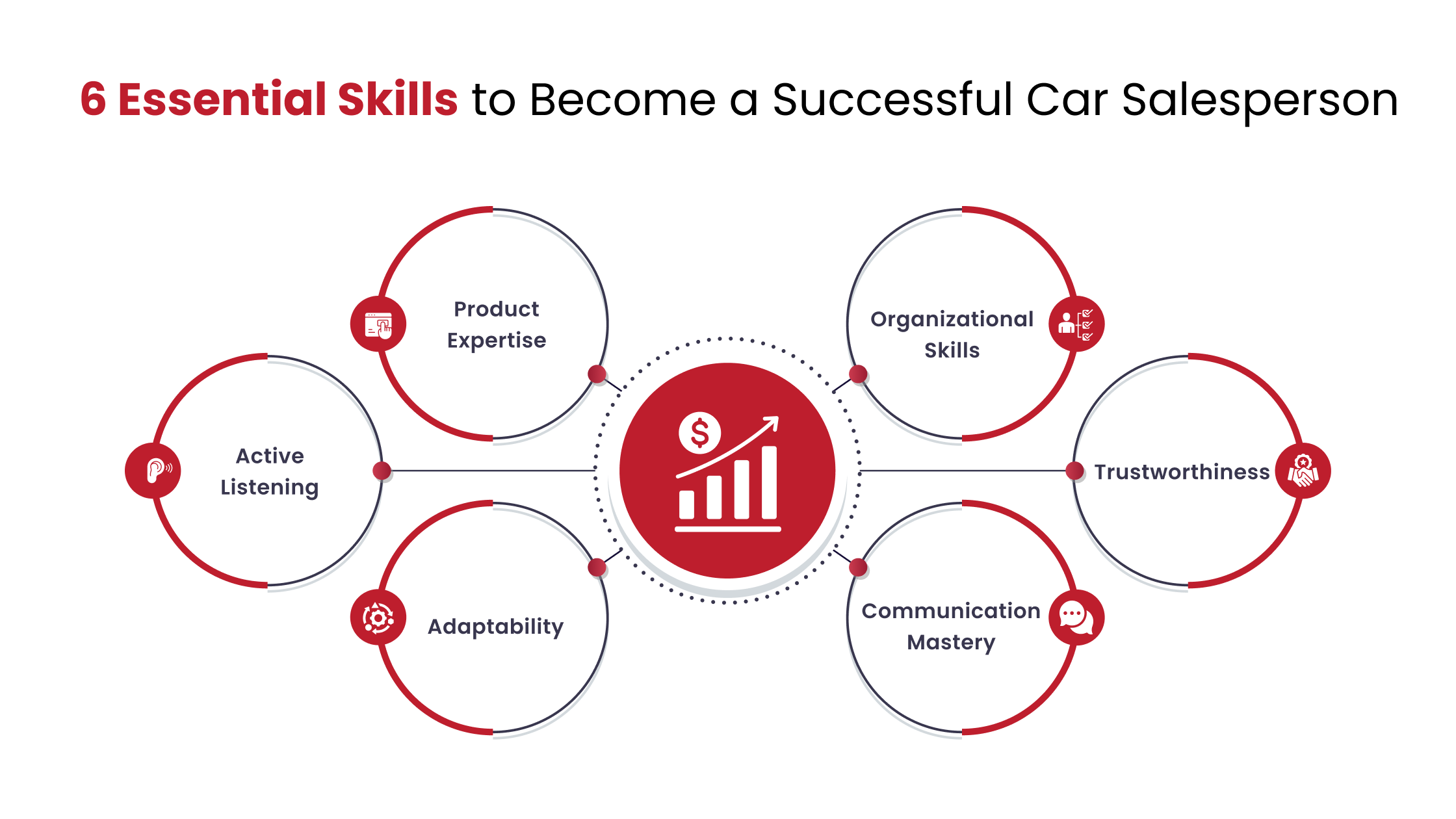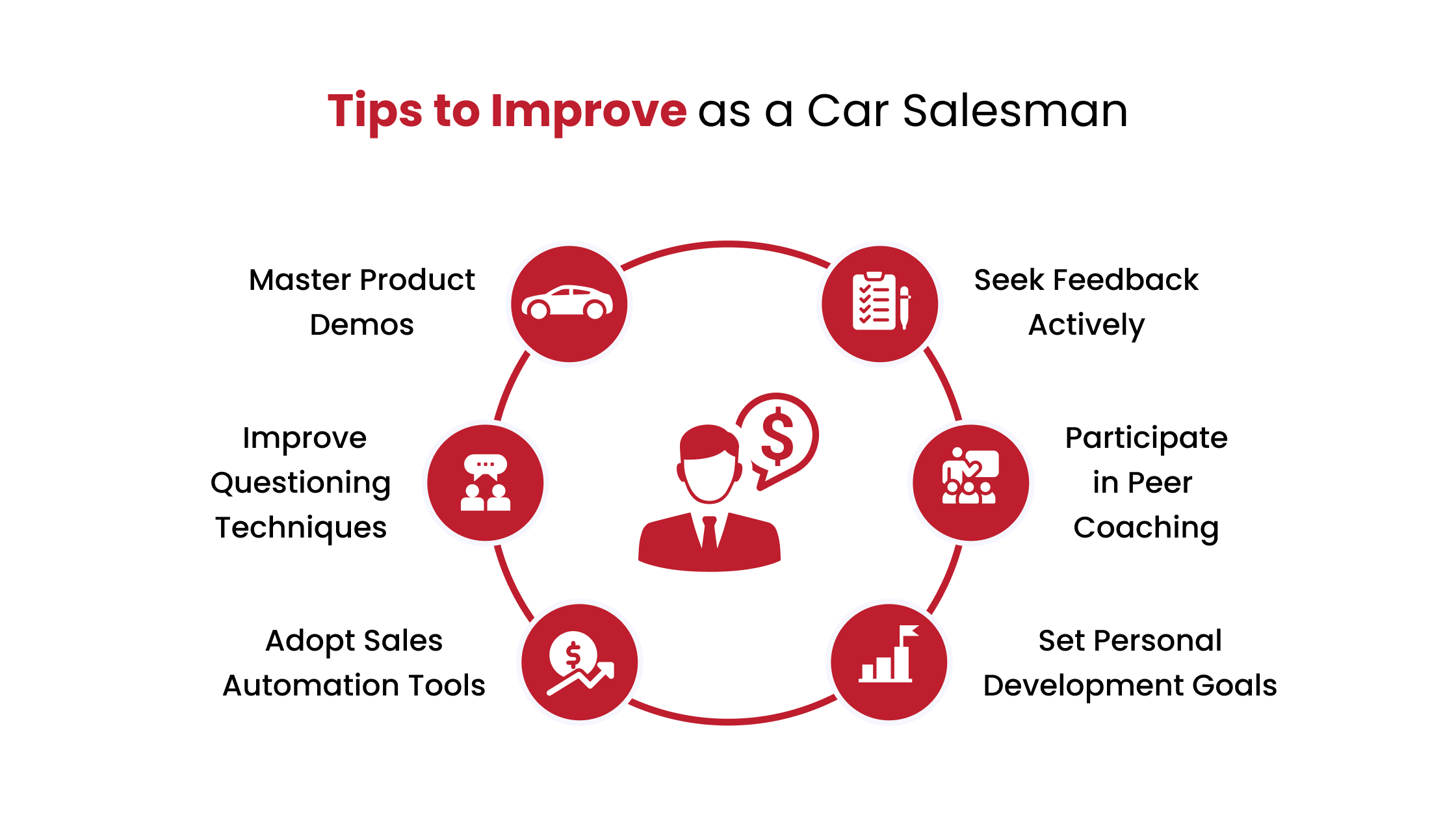6 Essential Skills to Become a Successful Car Salesperson

“Stop selling, start helping.”
These wise words by Zig Ziglar perfectly capture what it means to be a modern car salesperson. Your interaction with potential customers should not be about bombarding them with facts and figures or pushing them toward the most expensive model. You should instead guide them to the right choice based on their needs.
Consider the customer. Armed with research from digital sources, 95% of vehicle buyers do their homework online, yet more than 95% of purchases take place in dealerships.
Why do people choose to buy their cars in person? Because buying a car is a significant investment, any buyer would prefer to check out the vehicle physically, and test drive their potential new ride before deciding. They also value the personal interaction that helps them make a final decision. This is where a great salesperson shines. They blend their knowledge with genuine care, ensuring customers feel heard, understood, and supported.
So, what does it take to be a successful car salesperson who provides real solutions and creates lasting relationships? Let’s break down the essential skills to make you stand out at the dealership.
6 Essential Skills to Become a Successful Car Salesperson
Becoming a successful car salesperson is more than knowing how to close a deal. You must master skills that turn every interaction into a delightful experience for the customer.

Here are six essential skills you'll need to stand out on the showroom floor:
1. Product Expertise
Be interested to be interesting—This is not just a catchy phrase but perfectly captures the essence of product expertise in car sales. Memorizing specifications and features is not enough. You must deeply understand every vehicle’s engineering, capabilities, and use cases. As an expert and well-informed car salesperson, you should know how different models suit varied lifestyles and needs.
Take, for example, a customer looking for fuel efficiency for their daily commute. Instead of simply listing fuel economy stats, a skilled salesperson might ask, "How far is your commute? Are you looking for the best mileage to decrease fuel costs?" This shows genuine interest and helps tailor the conversation to the customer's situation.
Or consider someone dreaming of weekend adventures. A salesperson with true product expertise might inquire, "Do you need extra cargo space for camping gear or sports equipment?" By aligning the vehicle's features with the customer’s lifestyle, the salesperson demonstrates their knowledge and commitment to the customer’s needs.
By engaging in this way, the salesperson transforms standard feature highlights into meaningful benefits that resonate personally with the buyer.
2. Active Listening
Have you ever noticed how some car salespeople seem to know exactly what customers are looking for? Well, it's not mind reading; it's called active listening.
Here's how active listening helps you understand customer needs:
i) Listening: Don't just wait for your turn to talk. Focus on what customers say about their priorities. Are they concerned about safety features for children? Do they crave a fuel-efficient car for daily commutes? The more you listen, the better you match them with the perfect car.
ii) Asking: Skip the quiz show format and focus on the conversation! Ask straightforward, easy-to-understand questions about their needs, such as "What's most important to you in a new car?" or "How do you usually use your car during the week?"
These questions show you care and encourage them to share what matters most.
iii) Repeating: Demonstrate your engagement by repeating critical points in your own words. For example, "So, it sounds like you're looking for a fuel-efficient car with plenty of space for weekend trips. Is that right?"
This confirms you're paying attention and allows them to clarify anything they might have missed.
While these techniques help you build a rapport and better match cars to customer needs, objections can still arise. To learn specific strategies for turning those objections into opportunities, check out our blog on 6 Tips for Overcoming Objections in Car Sales: Turning 'No' into 'Yes.' This resource will equip you with the skills to address and overcome common sales objections, helping you convert more inquiries into sales.
3. Adaptability
Customers walk through the door with diverse needs and preferences. Some might be tech-savvy and crave a quick, informative test drive, while others might prefer a more relaxed, detailed explanation.
Here's how adaptability becomes essential:
i) Reading the Room: Become a master observer. Pick up on nonverbal cues and communication styles. Does a customer seem eager to jump in or hesitant and want more information? Understanding these signals allows you to tailor your approach, building trust and rapport from the very beginning.
ii) A Personalized Journey: Adapt your communication style and pace to create a smooth buying experience. Adaptability is the key to unlocking this potential and building strong relationships with each person who walks through your door.
For more detailed strategies on converting initial customer visits into sales, check out our blog, Convert Visitors to Customers: 10 Steps to Car Sales.
4. Organizational Skills
Managing leads, follow-ups, and sales documentation ensures that opportunities are not missed. Staying organized in a bustling dealership environment can set you apart as a reliable and professional salesperson.
Here’s how to master organizational skills:
i) Timely Follow-Ups: Keep a detailed record of all customer interactions, including the preferences and the car the customer has shown interest in. Schedule timely follow-ups to show that you value their time and are dedicated to meeting their needs.
ii) Streamlined Documentation: Maintain accurate and up-to-date sales documentation. This helps close deals efficiently and ensures a smooth and hassle-free buying experience for your customers.
iii) Lead Management: Use CRM tools to track and manage leads effectively. Maintain a well-organized database, prioritize efforts, and focus on the most promising prospects, ensuring every potential sale deserves attention.
5. Trustworthiness
Trust is the key to making customers feel valued. Here's how to make trustworthiness your strongest skill:
i) Be Honest: Always tell the truth about the cars you’re selling. Whether it's the price, features, or potential that the customer desires to have, honesty about the vehicle is a vital feature of a successful car salesperson.
ii) Keep Your Promises: If promises are made, it is essential to follow up or find out more information promptly. Following through on promises builds reliability and shows that the salesperson is reliable.
ii) Share Success Stories: Use testimonials from happy customers to build credibility. Real-life stories help new customers feel confident about trusting a salesperson.
Building trust is just one part of closing sales effectively. For more dynamic strategies and actionable tips to help you close deals even faster, look at our blog on 8 Proven Car Sales Tips: Close More Deals, Faster.
6. Communication Mastery:
Great communication is key to connecting with customers. Here’s how to make communication skills stand out:
i) Power of Silence: Great questions often need thoughtful answers. After asking a thoughtful question like, "What are you looking for in terms of safety features?" give your customers a moment to think and respond. This is crucial for building rapport. While it’s tempting to fill the silence, especially when feeling excited or nervous, silence can sometimes be mighty.
ii) Clear and Simple: Explain things in a way that's easy to understand. Think of it as sharing tips with a friend. Use simple examples and relatable stories to make the features and benefits of a car easy to grasp.
For instance, instead of saying, "This model features a turbocharged engine," you might say, "This car has a special engine that gives you more power without using extra fuel, which means quicker acceleration when you need it without costing you more at the pump."
iii) Friendly Approach: Start every conversation with a smile and a warm tone. It's like welcoming someone to a fun event, making customers feel comfortable and at ease.
For example, you could say, "Hello! Great to see you. Are you here to check out something specific, or are you just starting to explore your options?"
iv) Engaging Stories: Turn the sales pitch into a captivating story. Share exciting incidents about other customers’ positive experiences. Use vivid details to show how a car's features can improve life, turning basic facts into an appealing narrative.
For example, "One of our customers recently took this model on a road trip and loved how the adaptive cruise control made their long drive much easier. They could relax more on the highway, even in traffic."
Tips to Improve as a Car Salesman

Becoming a top car salesman involves continuous learning and refining of skills.
Here are some practical tips to help improve and stand out in the competitive world of car sales:
1. Master Product Demos
Regularly practice and perfect your vehicle demonstrations to highlight features effectively and answer questions dynamically. A polished demo can make a lasting impression and help customers see the car's value. This is when the buyer gets to judge the car’s features and ask questions.
2. Improve Questioning Techniques
Develop a set of open-ended questions that encourage customers to express their needs and preferences, allowing for more tailored conversations. Questions like, "What features are most important to you in a new car?" or "How do you typically use your vehicle?" can reveal critical insights that help guide your sales approach.
3. Adopt Sales Automation Tools
Integrate advanced tools that automate routine tasks, like scheduling follow-ups or sending out personalized emails, freeing up more time for customer engagement. It’s like having a silent assistant keeping everything on track. Tools like CRM systems can help you stay organized and ensure no lead falls through the cracks.
4. Seek Feedback Actively
The work isn't done when the customer drives off the lot with their car. Building a long-term relationship is essential for repeat business and generating positive word-of-mouth for the dealership. Word of mouth holds a significant role in the automotive industry. One key strategy for a successful car salesman is maintaining lifetime customers through follow-ups and garnering referrals.
After the sale, follow up to check how they like the car. Call them after a week to see if they face any issues and offer suitable solutions.
Bonus Tip: Encourage customers to leave a review or testimonial on the dealership's webpage or social media. Request referrals and express gratitude for their business. Personalized communication, such as a sincere video message, can leave a lasting impression. Small gestures like these reinforce the relationship and enhance customer loyalty.
5. Participate in Peer Coaching
Engage in role-playing sessions with colleagues to practice handling different sales scenarios and refine your approach based on peer input. It’s like sharpening your skills on a whetstone, preparing you for any situation.
Additionally, consider opting for online virtual training courses or joining an Automotive Training & Consulting workshop. Peer coaching sessions can expose you to new techniques and perspectives you might not have considered.
6. Set Personal Development Goals
Define measurable goals for improving sales skills, and regularly assess your progress against these targets. Setting these goals is like charting a course for success, ensuring you stay on track and reach your full potential.
For example, aim to improve the closing rate by a certain percentage or become proficient in a new sales technique.
To succeed in this fast-paced industry, adaptation and constant improvement are required. A good car sales associate should implement these suggestions into their daily endeavors to reinforce performance, forge closer bonds with clients, and advance their professional success.
How Does Automotive Training Help?
According to the National Automobile Dealers Association (NADA), salespeople who undergo continuous training see a 10-15% increase in sales performance compared to those who don't.
Investing in training not only boosts confidence but also equips you with the latest industry knowledge.
The saying goes, "The best investment you can make is in yourself."
1. Always Up-to-Date: Proper Training ensures you're well-versed in the latest car models and features to answer customer questions confidently. Staying updated on the newest technologies and trends helps you provide accurate and relevant information, which can significantly influence a customer's buying decision.
2. Better Communication: Learn practical tips on communicating more effectively to ensure you connect well with every customer. Training programs often include modules on active listening, persuasive speaking, and nonverbal communication, all essential skills for building customer rapport and trust.
3. Ready for Any Situation: Training prepares you to handle different types of customers and scenarios, ensuring you're adaptable and confident. This includes learning how to address common objections, manage difficult conversations, and tailor the approach to meet individual customer needs.
4. Stay Organized: Learn organizational tricks and tools that help you effortlessly track customer interactions and follow-ups. Effective organization ensures every lead is noticed and every customer receives timely and personalized attention, enhancing their overall experience.
5. Earn Trust: Training reinforces the importance of honesty and integrity, helping car salespersons build strong, trusting customer relationships. You can create a solid foundation for long-term customer loyalty and positive word-of-mouth by consistently demonstrating transparency and reliability.
6. Continuous Improvement: Stay current with training on new technologies and sales strategies to sharpen your skills. The automotive industry constantly evolves, and ongoing training helps you stay ahead of the curve, ensuring you offer customers the best possible service and expertise.
By incorporating these training benefits into your daily routine, you will improve as a car salesman and enhance the overall customer experience, leading to tremendous success and satisfaction in your career.
In conclusion, enhancing your skills as a car salesman through continuous training and development boosts your confidence and significantly improves your performance and customer satisfaction. Investing in your growth is a surefire way to stay ahead in the competitive automotive sales industry.
Boost Your Sales Skills with ATN's Expert Training Programs!

The car sales techniques highlighted in this blog can certainly elevate your approach, but professional training is key to excelling and outpacing your competition. This is where the Automotive Training Network (ATN) steps in. With 40 years of expertise in virtual training, sales training, BDC boot camps, and customized in-dealership training programs, we tailor our solutions to meet your team's specific needs.
Under the guidance of Tom Stuker himself, you’ll receive personalized coaching that makes achieving your sales goals seem almost effortless.
Are you ready to boost your sales skills and outperform the competition? Contact us today to see how we can help you close deals faster and more confidently!
